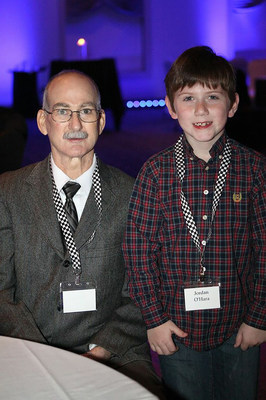Indiana's 1st Use Of The SynCardia Total Artificial Heart Helped Pat O'Hara Beat Genetic Heart Failure
TUCSON, Ariz., Sept. 3, 2014 /PRNewswire/ -- With the help of the SynCardia temporary Total Artificial Heart, Patrick "Pat" O'Hara was bridged to a donor heart transplant and beat genetic heart failure that claimed the lives of two siblings and caused a third to have a heart attack.

O'Hara, from Claypool, Indiana, was told he had only three to four months to live when he was admitted in March 2013 to Indiana University Health Methodist Hospital in Indianapolis. He couldn't breathe after any type of exertion. His voice was weak and his fingernails had turned blue. His heart, liver and kidneys began to fail.
Doctors determined he was too weak to receive a left ventricular assist device (LVAD) or to be put on the donor heart transplant waiting list.
O'Hara, 60, was facing a deadly outcome that had become all too familiar for his family. He suffered from idiopathic hypertrophic subaortic stenosis (IHSS), a genetic condition in which there is a thickening of the heart ventricle. This creates an enlarged heart muscle and restricts the amount of blood the ventricles can pump.
The disease had claimed a brother, who died at the age of 38; another brother survived a heart attack in January 2013, and his sister died of a heart attack in April 2013.
With O'Hara's condition rapidly declining, IU Health Methodist cardiothoracic surgeon Dr. I-wen Wang, who specializes in heart and lung transplantation and heart devices,recommended the SynCardia Total Artificial Heart implant.
Like a heart transplant, the SynCardia Total Artificial Heart replaces the two diseased heart ventricles and four heart valves. It is the only approved device that eliminates the source of end-stage biventricular heart failure, a condition in which the two ventricles no longer can pump enough blood for the patient to survive.
O'Hara agreed to the implant surgery, driven by the desire to watch his toddler grandchildren grow up and to help other people with heart failure. O'Hara's SynCardia Heart implant would be the first one performed in Indiana.
"You're scared, but at the same time that's what God wanted and I felt it was the right thing to do," he says.
O'Hara received his SynCardia Total Artificial Heart on June 26, 2013. The SynCardia Heart pumps up to 9.5 liters of safe blood flow through each of the device's two ventricles per minutemore than what the average human heart can pump.
"Right after the Total Artificial Heart implant, his fingernails had color," recalls his daughter Kelly Miller. "The biggest change was the sound of his voice. Before the implant, it didn't have the energy that it has now."
The Total Artificial Heart also helps normalize the pressure of the blood returning to the heart (central venous pressure), which helps vital organs such as kidneys and the liver recover. This was the case with O'Hara.
O'Hara became the first Indiana resident to be discharged from the hospital without a human heart, thanks to the Freedom®portable driver, which powers the SynCardia Heart. O'Hara carried his 13.5-pound Freedom driver in a backpack. After 129 days of hospitalization, O'Hara was discharged to wait at home for his donor heart.
Back home, O'Hara spent time with his family, went fishing and danced at a Methodist Health Foundation banquet. The foundation helped pay for his medical expenses.
O'Hara received a donor heart transplant on November 27, 2013. Since his hospital discharge on December 23, he's lived with his fatherhis mother died in November unrelated to IHSSon 2.5 acres "with a cow, two goats and five chickens," he says.
He puts his new-found energy to constant use. He works on Model T Fords and is remodeling the kitchen, along with doing daily work around the farm. "I'm kind of keeping pretty busy," he says.
The SynCardia Total Artificial Heart and subsequent heart transplant eliminated O'Hara's IHSS and gave him a second chance at life. "It is an amazing device," he says.
For additional information, please visit: http://www.syncardia.com/
- Like SynCardia on Facebook
- Follow SynCardia on Twitter @SynCardia
- Connect with SynCardia on LinkedIn
- Share and Discover on Google+
About the SynCardia temporary Total Artificial Heart
SynCardia Systems, Inc. in Tucson, Arizona is the privately-held owner and manufacturer of the world's first and only FDA, Health Canada and CE approved Total Artificial Heart.
Originally used as a permanent replacement heart, the SynCardia Total Artificial Heart is currently approved as a bridge to transplant for people suffering from end-stage biventricular heart failure in which both ventricles can no longer pump enough blood for a person to survive.
More than 1,350 implants of the SynCardia Total Artificial Heart accounts for over 400 patient years of life on the device. Since January 2011 more than 400 SynCardia Hearts have been implanted.
SynCardia Systems also manufactures the Freedom® portable driver, which powers the SynCardia Heart while allowing clinically stable patients to leave the hospital to live at home and in their communities. The wearable Freedom driver has been used by over 175 patients, accounting for over 100 years of support.
Photo - http://photos.prnewswire.com/prnh/20140902/142197
SOURCE SynCardia Systems, Inc.
Help employers find you! Check out all the jobs and post your resume.
